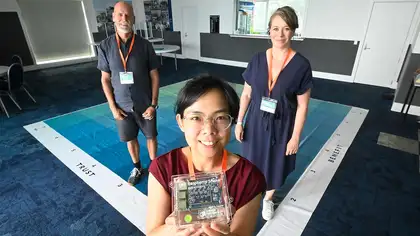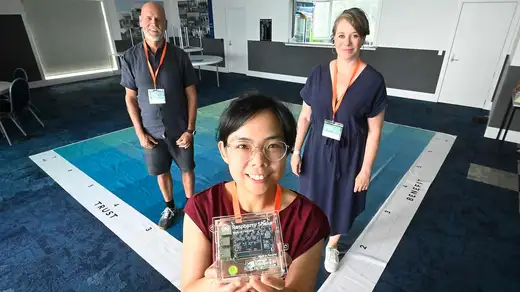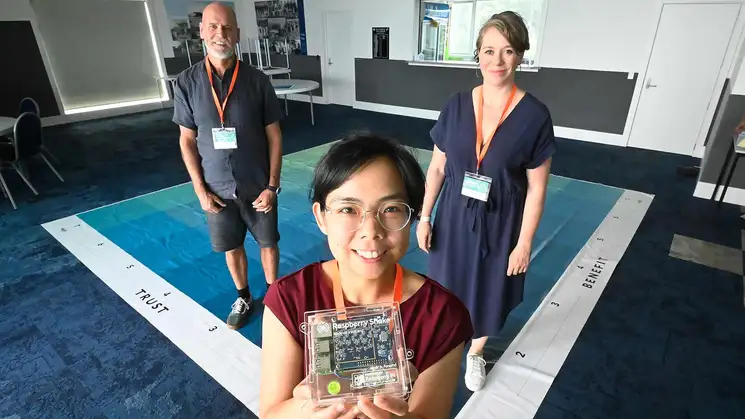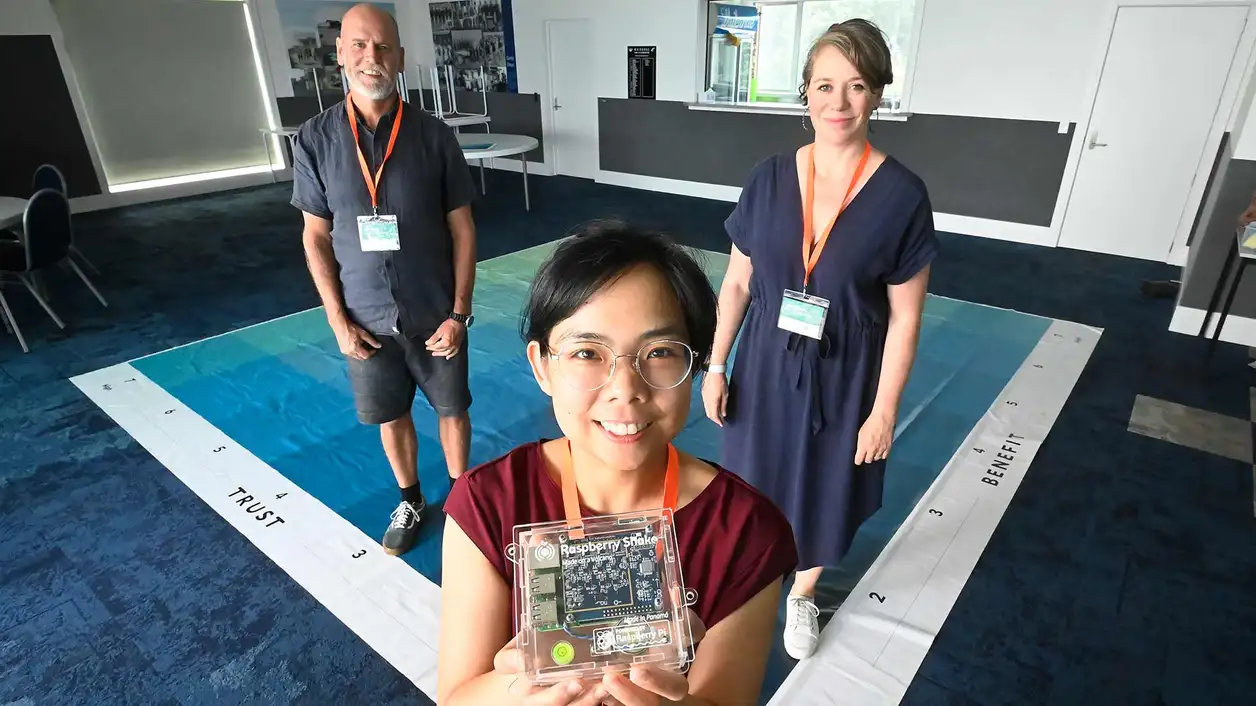What we do
The Joint Centre for Disaster Research (JCDR) provides a state-of-the-art, high-quality, graduate teaching and contemporary research programme to Aotearoa New Zealand and people worldwide.
By doing so, we develop community disaster resilience by leading and delivering risk identification, communications, and reduction and readiness programmes in communities and organisations across the nation and beyond.
Who we are
World-class teaching by world-class faculty
We are Aotearoa New Zealand’s longest-serving accredited educator in this area.
From short professional development courses, undergraduate certificates and bachelor qualifications to postgraduate diplomas, certificates, master degrees and PhDs, we offer one of the broadest ranges of emergency management education, development and research anywhere.
As one of the pioneers in Australasia to offer a doctorate in emergency management (Doctor of Philosophy in Emergency Management), we are a world-leading institution that underpins its teaching with rich and contemporary research.
Our research
The JCDR does multi-disciplinary applied research to understand the impacts of natural, man-made and environmental disasters on communities.
We work with our partners to improve the way societies manage disaster reduction, readiness, response and recovery.
Research areas
The JCDR covers a broad range of topics across emergency management that tackle real-world situations and solutions.
Disaster risk and science communication
Disaster risk and science communication is the communication of science advice for individual and organisational decision-making during natural hazard events.
Topic areas include:
- communication of probability forecasts and uncertain science advice
- hypothetical scenarios to explore effective communication
- public response to aftershock information
Education, outreach and social networking tool
We measure community understanding of, and preparedness for, natural hazards including volcanic eruptions. We specialise in participatory methods and risk perception research.
Our results are used to develop scenarios, training tools and educational strategies for communities, businesses and schools.
We also specialise in the use and impact of social networking tools in a disaster context. Our team focuses on people's interactions with information and communication technologies, and how this can contribute to a resilient culture.
Our key area is public information-seeking activities and the self-organising capabilities of disaster-affected communities.
Māori and Indigenous risk reduction and disaster management
The Indigenous Disaster Risk Management team engages with Māori communities and other Indigenous peoples.
Topic areas include:
- the role culture plays in facilitating disaster preparedness
- risk mitigation
- emergency management
We also look at disaster recovery and community resilience in the context of humanitarian, health and natural hazard events.
Psychosocial support and community resilience
We research the psychosocial impact of disasters on health care and social welfare professionals. We advise agencies including the Ministry of Social Development and the Ministry of Health.
We also develop tools and guidelines to empower communities to become resilient to natural hazard events.
Our research focuses on understanding the factors that enable a community to withstand the consequences of natural hazards. We also research local, regional and national factors that influence communities.
Lauren Vinnell's profile
David Johnston's profile
Julia Becker's profile
Multi-hazard warning systems
Warnings comprise an important component of responding to emergencies. We undertake research on different aspects of warnings systems.
Topic areas include:
- the technological components of warnings systems
- preparedness and planning for effective warning
- best-practice warning communication
- understanding human behaviour in warning situations.
We investigate warnings across a range of perils including
- earthquakes
- tsunami
- weather and flood events
- volcanoes
- landslides in both short-fuse and longer term warning contexts
Disaster response and recovery management and leadership
The coordination and leadership of organisations and communities in preparing for, responding to, and recovering from emergency situations is a crucial area of research.
Understanding how response and recovery capabilities are most effectively developed, maintained, and learned from is an essential area of emergency management research.
Topic areas include:
- emergency response
- management, planning and response
- recovery management and leadership
- incident command and management
- system development and application
- centre design and operation
- intelligence delivery
- capability development
People-centred technologies and systems for disaster management
Our research looks into enhancing disaster resilience through understanding technology and systems and their intersection with human behaviour especially in the context of crises. Our team investigates both the technical feasibility and social acceptability of technological systems.
Topic areas include:
- artificial intelligence
- big data analytics
- decision support systems
- early warning systems
- technology acceptance
- usability, user perceptions and behaviour
We welcome research ideas that use methodologies such as design science and participatory design.
Joint Centre for Disaster Research news
Wellington students compete to build a novel tsunami alert system
The students were taking part in the 2024 CRISiSLab Challenge, which aims to encourage young people into science, technology, engineering and mathematics (STEM).
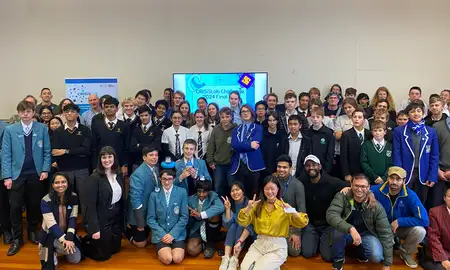
Research shows New Zealanders know very little about early earthquake warning systems
New research published in Frontiers in Communication today reveals that most New Zealanders know very little about systems for early earthquake warning in Aotearoa New Zealand.
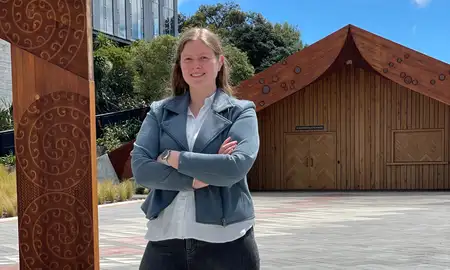
Next generation of scientists excel in the CRISiSLab Challenge
The CRISiSLab Challenge aims to encourage young people into science, technology, engineering, and mathematics.
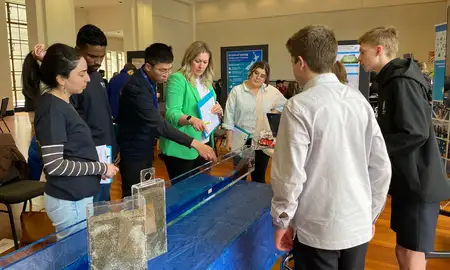
Design for emergencies
A day after the Hunga Tonga-Hunga Ha’apai eruption in January 2022, PhD student and Te Hiranga Rū QuakeCoRE scholar Matt Luani was called to help.

Partners
We work with a range of academic and industry partners.
The Crisis Response and Integrated Simulation Science Laboratory (CRISiSLab)
The CRISiSLab is a research and learning laboratory based out of the JCDR providing a platform to conduct transdisciplinary socio-technical research at the human-technology interface.
Te Toi Whakaruruhau o Aotearoa – The EQC Mātauranga Māori Disaster Risk Reduction Centre
Contributes to creating a resilient New Zealand through building Māori disaster risk reduction research and workforce capabilities as well as developing and applying indigenous innovation to minimise hazard risks and impacts on the people and taonga of Aotearoa.
Te Toi Whakaruruhau o Aotearoa
We also work with:
Research projects
Explore a selection of our recent research projects.
Facilitating psychosocial community recovery
The project, updating psychosocial support guidance and reviewing community recovery models is funded by the MBIE COVID-19 Innovation Acceleration Fund and resulted in two reports.
A desk review examined the psychosocial impacts of the COVID crisis and provided updated psychosocial support approaches and interventions.
A second related report focused on facilitating community recovery. The reports were shared in regional workshops to support agencies in their recovery planning.
Earthquake Early Warning: Marion Tan and Raj Prasanna
The project is investigating the feasibility of using community-based low-cost sensors to issue out earthquake early warnings (EEW) for Aotearoa New Zealand.
Understanding the viability of EEW for New Zealand requires a multi-faceted transdisciplinary approach that engages with various stakeholders to address complex technical and social issues.
The project has four research themes:
- social sciences – including public and stakeholder engagement
- earthquake prediction and modelling
- IoT, sensors, and telecommunications
- data and knowledge management.
HIWeather Citizen Science Project
Part of the World Meteorology Organization, HIWeather Citizen Science aims to improve the effectiveness of weather-related hazard warnings.
We research, investigate, and share resources from existing successful citizen science initiatives. We also provides tools to encourage and enable more groups to do citizen science.
Hawke's Bay Tsunami Warning package project
We investigated how we might accommodate large numbers of people after a large earthquake and tsunami in Hawke's Bay.
The Hawke’s Bay Regional Alerting Systems Review project team is doing a review of what public alerting tools currently exist and assessing the best options for the region.
Communicating Uncertainty, Science, and Risk
We are trying to understand how to improve communication of physical science to decision makers, including the public.
Communication about:
- mental models and science communication in a crisis
- uncertainty
- multi-hazard risk
- probability, likelihoods, forecasts, and warnings
- disaster preparedness
- spatial and temporal uncertainty visually
- enhancing inter-agency science communication
International Centre of Excellence in Community Resilience
The International Centre of Excellence in Community Resilience is based in Wellington. The centre is working with others on a region-wide initiative to answer the question ‘How does a community make itself resilient to future disasters?’.
Find out more about the International Centre of Excellence in Community Resilience
Study emergency management
We offer emergency management programmes from short professional development courses and workshops to tertiary education like undergraduate qualifications, postgraduate diplomas, certificates, master's degrees and PhDs to people worldwide.
Emergency management qualifications
Short courses
We offer a set of three short professional development courses in emergency management.
Emergency Management Institute
Learn about emergency management in this five-day course held every March in Wellington. Explore the theory and practice of dealing with emergencies in New Zealand and around the world.
Emergency Management Institute short course
Response and Recovery Leadership short courses
These courses provide professional training for response and recovery leaders across the all-hazards National Security System working at local, regional, and national levels.
Response and Recovery Leadership short courses
Centre staff
Director

Professor David Johnston
Deputy directors

Associate Professor Julia Becker
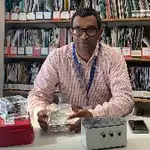
Associate Professor Raj Prasanna
Staff









Part-time, casual and research associates










Publications and reports
Staff and students at the centre publish internationally recognised research through a variety of channels – including journals, books, conference papers and disaster publications.
2022 publications and reports
Anderson, C.L., Rovins, J., Johnston, D.M., Lang, W., Golding, B., Mills, B., Kaltenberger, R., Chasco, J., Pagano, T.P., Middleham, R., Nairn, J. (2022). Connecting Forecast and Warning: A Partnership Between Communicators and Scientists. P. 87-114. In: Golding, D. (ed.) 2022. Towards the “Perfect” Weather Warning Bridging Disciplinary Gaps through Partnership and Communication. Springer.
Read publication online
Algiriyage, N., Prasanna, R., Stock, K., Doyle, E. E., & Johnston, D. (2022). Multi-source Multimodal Data and Deep Learning for Disaster Response: A Systematic Review. SN Computer Science, 3(1), 1-29.
Becker, J. S., McBride, S. K., Vinnell, L. J., Saunders, W. S. A., Leonard, G. S., Sullivan, T. J., & Gledhill, K. (2022). Earthquakes and tsunami. In T. K. McGee, E. C. Penning-Rowsell (Eds.), Routledge handbook of environmental hazards and society (pp. 13-32). DOI: 10.4324/9780367854584-3.
Becker, J. S., Vinnell, L. J., McBride, S. K., Nakayachi, K., Doyle, E. E. H., Potter, S. H., & Bostrom, A. (2022). The effects of earthquake experience on intentions to respond to earthquake early warnings. Frontiers in Communication, 7, 857004.
Read publication online
Buergelt, P., & Paton, D. (2022) Restoring the Transformative Bridge: Remembering and Regenerating our Western Transformative Ancient Traditions to solve the Riddle of our Existential Crisis. In A. Nicolaides, S. Eschenbacher, P. Buergelt, Y. Gilpin-Jackson, M. Misawa & M. Welch (Eds) The Palgrave Handbook on Learning for Transformation. New York: Palgrave/Springer. Pages 809-830.
Read publication online
Brown M, Pullon S, McKinlay E, Gray L, Darlow B. Template Analysis of a longitudinal survey: Making sense of free-text comments collected over time Journal of Research in Interprofessional Practice and Education. In press
Buergelt, P., & Paton, D. (2022). Facilitating effective DRR education and human survival: Intentionally engaging the transformation education-paradigm shift spiral. In H. James, R. Shaw, V. Sharma and A. Lukasiewicz (Eds.), Disaster Risk Reduction in Asia Pacific Governance, Education and Capacity. (pp. 97-122) Singapore; Springer.
Darlow, B., Brown, M., McKinlay, E., Gray, L., Purdie, G., Pullon, S. (2022). Longitudinal impact of pre-registration interprofessional education on the attitudes and skills of health professionals during their early careers: a non-randomised trial with 4-year outcomes. BMJ Open, 12(7): e060066.
Read publication online
Deligne, N. I., Jenkins, S. F., Meredith, E. S., Williams, G. T., Leonard, G. S., Stewart, C., Johnston, D., Zuccaro, G. (2022). From anecdotes to quantification: Advances in characterizing volcanic eruption impacts on the built environment. Bulletin of Volcanology, 84(1) doi:10.1007/s00445-021-01506-8.
Gray, L., Becker, J., MacDonald, C., & Johnston, D. (2022). Sizing up disaster risk reduction: a qualitative study of the voices of big bodied people in Aotearoa New Zealand. International Journal of Disaster Risk Reduction. 67 (2022) 102922.
Read publication online
Gray L, MacDonald C, Puloka A, Bocock C, Gwyther R, Rushton A, Puloka V, Becker JS, Kvalsvig A, Baker MG. The lived experience of hotel isolation and quarantine at the Aotearoa New Zealand border for COVID-19: A qualitative descriptive study. Int J Disaster Risk Reduction (2022) 102779.
Read publication online
Harrison, S. E., Potter, S. H., Prasanna, R., Doyle, E. E., & Johnston, D. (2022). ‘Sharing is caring’: A socio-technical analysis of the sharing and governing of hydrometeorological impact data in Aotearoa New Zealand. Progress in Disaster Science, 100213.
Harrison, S. E., Potter, S. H., Prasanna, R., Doyle, E. E., & Johnston, D. (2022). Identifying the Impact-Related Data Uses and Gaps for Hydrometeorological Impact Forecasts and Warnings. Weather, Climate, and Society, 14(1), 155-176.
Jayasinghe, K., Wijesinghe, C., Wijethilake, C., & Prasanna, R. (2022). Collaborative public service provision archetypes in healthcare emergencies: a case of COVID-19 administration in Sri Lanka. Journal of Public Budgeting, Accounting and Financial Management.
Khorram-Manesh, A., Goniewicz, K., Phattharapornjaroen, P., Gray, L., Carlström, E., Sundwall, A., Hertelendy, A.J. and Burkle, F.M., 2022. Differences in Ethical Viewpoints among Civilian–Military Populations: A Survey among Practitioners in Two European Countries, Based on a Systematic Literature Review. Sustainability, 14(3), p.1085.
Read publication online
Maypilama, L. Buergelt, P., Bukulatjpi, Y, Gundjarranbuy, R., Dhamarrandji, S.M., Paton, D., Smith, J. & Ali, T. (2022) “Waka Ngurrkanhayngu”: Regenerating the existence of life. Native Title Newsletter, Issue 1, 5-8.
Mowll, R., Becker, J., Wotherspoon, L., Stewart, C., Johston, D., Neely, D. P., Rovins, J., & Ripley, S. (2022). Infrastructure planning emergency levels of service for the Wellington region, Aotearoa New Zealand - a preliminary framework. International Journal of Disaster Risk Reduction.
Read publication online
Mowll, R., Stewart, C., Neely, D. P., Brenin, M., Fisher, M., Loodin, N. & Hutchison, S. (2022). Creating a post-earthquake emergency sanitation plan for the Wellington region, Aotearoa New Zealand. Australian Journal of Emergency Management. Vol 37 (3). https://knowledge.aidr.org.au/media/9482/ajem-13-2022-03.pdf
McBride, S. K., Smith, H., Morgoch, M., Sumy, D., Jenkins, M., Peek, L., Johnston, D., Wood, M. (2022). Evidence-based guidelines for protective actions and earthquake early warning systems. Geophysics, 87(1), WA77-WA102. doi:10.1190/geo2021-0222.1
Paton, D., Buergelt, P.T., Her, R-S., Jang, L-j., Lai, R-L., Tseng, Y-L. & Wu, R-S. and Sagala, S. (2022) Regenerating Socio-Cultural Capacities and Capabilities in Disaster Recovery Settings: Repurposing, emergent and transformative processes. In T. McGee and E. Penning-Rowsell (Eds), Handbook of Environmental Hazards and Society. (pp. 442-457). London: Routledge. DOI: 10.4324/9780367856584
Paton, D. Buergelt, P., Pavavalung, E., Clark, K., Jang, L-j., & Kuo, G. (2022). All Singing from the Same Song Sheet: DRR and the Visual and Performing Arts. In H. James, R. Shaw, V. Sharma and A. Lukasiewicz (Eds.), Disaster Risk Reduction in Asia Pacific Governance, Education and Capacity. (pp. 123-146) Singapore; Springer.
Prasanna, R., Chandrakumar, C., Nandana, R., Holden, C., Punchihewa, A., Becker, J. S., Jeong, S., Liyanage, N., Ravishan, D., Sampath, R., & Tan, M. L. (2022). “Saving precious seconds”— A novel approach to implementing a low-cost earthquake early warning system with node-level detection and alert generation. Informatics, 9(25), 1–32.
Read publication online
Stewart, C., Young, N. L., Kim, N. D., Johnston, D. M., & Turner, R. (2022). Thunderstorm asthma: A review, risks for Aotearoa New Zealand, and health emergency management considerations. New Zealand Medical Journal, 135(1557), 49-63.
Stewart, C., Iremonger, S., Rosenberg, M., & Leonard, G. (2022). Volcano breath: a rare 'vog' event in the eastern Bay of Plenty, Aotearoa New Zealand.. The Australian Journal of Emergency Management, 37(2), 7-8.
Sørensen, JL., Ranse, J., Gray, L., Khorram-Manesh, A., Goniewicz, K., Hertelendy, A.J. (2022) Employees Perception of Organizational Crises and Their Reactions to Them – A Norwegian Organizational Case Study. Front. Psychol. 13:818422.
Read publication online
Sutton, S., Paton, D., Buergelt, P., Sagala, S. & Meilianda, E. (2022) ‘Village’ as verb: Sustaining a transformation in disaster risk reduction from the bottom up. Environmental Science and Policy, 137, 40-52.
Read publication online
Tan, M. L., Hoffman, D., Ebert, E., Cui, A., & Johnston, D. (2022). Exploring the potential role of citizen science in the warning value chain for high impact weather. Frontiers in Communication, 1–15.
Tan, M. L., Becker, J. S., Stock, K., Prasanna, R., Brown, A., Kenney, C., & Lambie, E. (2022). Understanding the social aspects of earthquake early warning: A literature review. Frontiers in Communication, 178.
Tahir Ali, Petra T. Buergelt, Elaine Lawurrpa Maypilama, Douglas Paton, James A. Smith & Noor Jehan (2022) Synergy of systems theory and symbolic interactionism: a passageway for non-Indigenous researchers that facilitates better understanding of Indigenous worldviews and knowledges, International Journal of Social Research Methodology, 25:2, 197-212.
Read publication online
Turnbull SM, Hobbs M, Gray L, Harvey E, Scarrold W, O’Neale DR. Investigating the transmission risk of infectious disease outbreaks: the Aotearoa Co-incidence Network (ACN): a population-based study. The Lancet Regional Health - Western Pacific. Vol 20, March 2022, 100351.
Read publication online
Vinnell, L. J., Hudson-Doyle, E. E., Inch, P., Tan, M. L., Becker, J. S., & Johnston, D. M. (2022). Evacuation behavior and information needs of Wellington, Aotearoa New Zealand residents following the 5 March 2021 Mw 7.3 East Cape Earthquake. Seismological Research Letters.
Read publication online
Vinnell, L. J., Inch, P., Johnston, D. M., & Horspool, N. (2022). Behavioral responses to earthquake shaking: Video footage analysis of the 2016 Kaikōura earthquake in Wellington, Aotearoa New Zealand. Earthquake Spectra.
Read publication online
Other disaster publications
Australasian Journal of Disaster and Trauma Studies
An electronic online journal, edited by the Centre and published by the School of Psychology.
GNS Science
Institute of Geological and Nuclear Sciences Ltd, a New Zealand Crown Research Institute.
NIWA
National Institute of Water and Atmospheric Research, a New Zealand Crown Research Institute.
EQC
The Earthquake Commission is a New Zealand Crown entity.
Online Institutional Repository, Disaster Research Center (DRC), University of Delaware
Contact us
Joint Centre for Disaster Research
- Phone
- Location
Physical address
Massey University
Building T28 - (via Entrance E from Tasman St)
Mt Cook
Wellington
New ZealandPostal address
Joint Centre for Disaster Research
Massey University
PO Box 756
Wellington 6140
New Zealand
